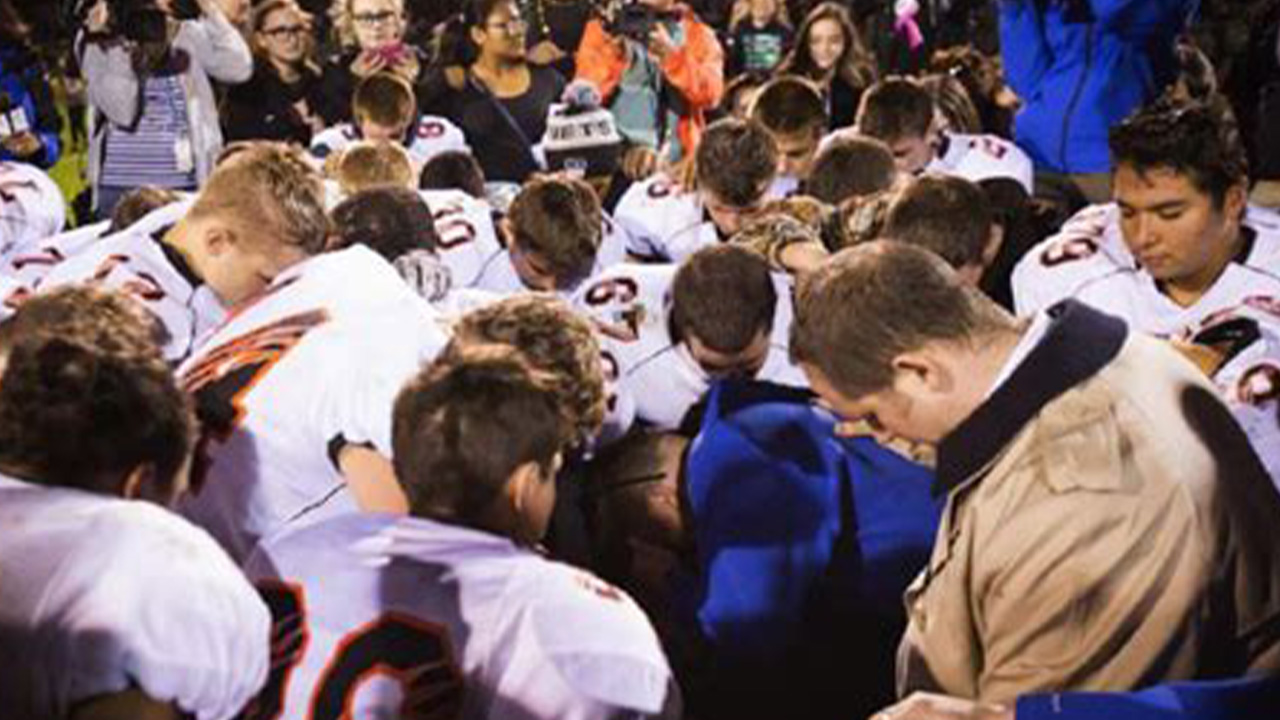


Get a free copy of Parental Rights & Education when you subscribe to our newsletter!

UPDATE: The Supreme Court will hear arguments this morning at 10 a.m. in the case of high school coach Joe Kennedy, who was fired for publicly praying on the 50-yard-line after each game had ended, prayers that many of his players voluntarily joined.
The case will determine whether silent prayers are protected by the Constitution and whether religious freedom applies to public sector employees while they’re officially working.
“No teacher or coach should lose their job for simply expressing their faith while in public,” said Kelly Shackelford, president and CEO of First Liberty, one of two law firms representing Kennedy. “By taking this important case, the Supreme Court can protect the right of every American to engage in private religious expression, including praying in public, without fear of punishment.”
{Published October 20, 2021} A group of attorneys general for 24 states have filed a brief requesting that the U.S. Supreme Court review a decision by the Ninth Circuit Court of Appeals that held that a high school football coach could be fired for praying after games.
Part of Coach Joseph Kennedy’s job description was to be a “coach, mentor, and role model for student athletes.” It also required that he attempt to help athletes become “good human beings.”
Kennedy, a Christian, started praying on the 50-yard line after games. Those prayers were “a brief, quiet prayer of thanksgiving for player safety, sportsmanship, and spirited competition.” As athletes voluntarily joined him, however, they became motivational speeches to players of both teams.
Kennedy was told he had to bar students from praying with him, but students joined voluntarily anyway.
Kennedy was fired, and a legal suit made its way to the Ninth Circuit Court of Appeals. “When Kennedy kneeled and prayed on the fifty-yard line immediately after games while in view of students and parents, he spoke as a public employee, not as a private citizen, and his speech therefore was constitutionally unprotected,” the court ruled.
Now the Republican attorneys general of 24 states are urging the Supreme Court to review the case. The brief states, “These Americans do not abandon their religious liberty at the doors of their workplaces. Amici States are interested in protecting the rights of all public employees—in their States and elsewhere— from the sort of heavy-handed government control that pushes skilled employees out of public service and deters highly qualified applicants from entering it in the first place.”
Other groups have also filed amicus briefs supporting the coach’s right to pray, including former Vice President Mike Pence’s organization Advancing American Freedom. Pence said,
“When a public official engages in silent prayer on bended knee following the completion of one of his most important job responsibilities, that prayer is universally understood by all reasonable observers to be an act of personal thanks and devotion. It is absurd to label an act of obvious personal gratitude and humility governmental speech that is prohibited by the Constitution.”
He added, “Indeed, it is commonplace in our Republic for public officials to pray aloud in front of public audiences, which has since the time of the Founding been understood to be a permissible and healthy expression of the personal faith of the speaker, rather than an impermissible endorsement of religion by the government.”
While the Supreme Court declined to take the case in 2019, four justices signed a statement that called the Ninth Circuit’s understanding of the free speech rights of public school teachers “troubling and may justify review in the future.”

Free exercise of religion allows people to be who they are, rather than a government automaton that must hide their most closely held beliefs. An employee praying in view of students is not government endorsing religion, it is a human being offering an individual prayer, which hurts no one but which some students may deeply value.
The late college football coach Bobby Bowden was a devout Christian who said of Kennedy, “I’m proud of him for standing up for what he believes. I’m proud of him for putting God first.” He added, “I don’t know how I didn’t get fired because I prayed all the time at Florida State.”
Bowden’s influence was pivotal in the lives of men like future University of Georgia Head Coach Mark Richt, whom Bowden led to Christ. Richt became known for his character and positive influence on players. One former player Tra Battle said that, at one point, he was about to commit suicide but decided to call Richt. Despite not talking in years, Richt invited Battle to his house and paid for his therapy.
Battle recently said, “I’ve never said this to your face, Coach. But I thank you. I thank you for saving my life. I thank you for being there when I made the call, and you answered. I’ll always be grateful for the man that you are.”
Bowden remarked of the Kennedy situation, “Who’s going to teach these kids if teachers and coaches and politicians don’t use the opportunity they have to help these people [and] pray for these people?”
It is because of Bowden’s influence that men’s lives were changed, including not just Mark Richt, but men like Tra Battle. Schools shouldn’t be firing staff for living out their faith — they should be thanking them.
